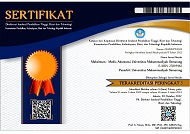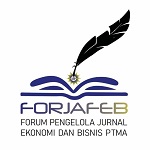Market Response to Green Investment Alternative in Indonesia: Readiness for Global Sustainability Standards
(1) Universitas Ahmad Dahlan
(2) Universitas Ahmad Dahlan
(3) Universitas Ahmad Dahlan
(4) Universitas Ahmad Dahlan
(5) Universitas Ahmad Dahlan
(*) Corresponding Author
Abstract
This research examines how the Indonesian capital market reacts to announcements of the ESG Leaders Index as a green investment indicator. It assesses the market's readiness to adapt to upcoming international sustainability reporting standards, such as IFRS S1 and S2. Using an event study approach, the study analyzes market reactions before, during, and after these announcements. The findings reveal that some companies, particularly in the property and energy sectors, experience significant early responses during the anticipation period, while others show delayed reactions in the adjustment phase. A key novelty of this research is its focus on Indonesia's market readiness for global sustainability standards. This area has been less explored in previous studies focused on developed markets. By incorporating both anticipation and adjustment periods, this study provides a more comprehensive understanding of how investors process ESG information in a developing market context.
Keywords
Full Text:
PDFReferences
Adnan, B. A., & Dadi. (2023). Tropical forest conservation efforts as climate change mitigation in Indonesia: A Review. Interdisciplinary International Journal of Conservation and Culture, 1(2), 80–89. https://doi.org/10.25157/iijcc.v1i2.3633
Adrianto, A. I. (2023). Do Investors Value Esg? Evidence From Indonesian Retail Investors. Jurnal Scientia, 12(1).
Aini, A. N., Sukmadilaga, C., & Ghani, E. K. (2023). Green Bonds, Investor Attention and Stock Market Reaction: Evidence from ASEAN Countries. International Journal of Energy Economics and Policy, 13(6). https://doi.org/10.32479/ijeep.15162
Ainy, R. N., Aisa, N. N., & Davila, P. I. (2024). Indonesian Market Response to Green Investment. Jurnal REKSA: Rekayasa Keuangan, Syariah Dan Audit, 11(2), 155–166. https://doi.org/10.12928/jreksa.v11i2.9108
Ainy, R. N., & Ariesanti, A. (2022). The Awareness of the Indonesian Market Toward the Corporate Social Responsibility of a Company. Jurnal REKSA: Rekayasa Keuangan, Syariah, Dan Audit, 9(1), 11–16. https://doi.org/https://doi.org/10.12928/jreksa.v9i1.5753
Amir, A. Z., & Serafeim, G. (2018). Why and how investors use ESG information: Evidence from a global survey. Financial Analysts Journal, 74(3). https://doi.org/10.2469/faj.v74.n3.2
Anis, I., Arsjah, R. J., Hartini, Agni, M. T., & Joseph, C. (2024). Unlocking Investment Efficiency : Exploring ESG Practices through Management Control System Dynamics. The Indonesian Journal of Accounting Research, 27(3), 471–504. https://doi.org/10.33312/ijar.754
Aulia, A., Febriyanti, F., & Umi, L. P. (2023). Trend Analysis Of ESG Disclosure On Green Finance Performance In Indonesia, Malaysia & Singapore Exchanges. JAK (Jurnal Akuntansi) Kajian Ilmiah Akuntansi, 10(1). https://doi.org/10.30656/jak.v10i1.5439
Bernard, V. L., & Thomas, J. K. (1989). Post-Earnings-Announcement Drift: Delayed Price Response or Risk Premium? Journal of Accounting Research, 27. https://doi.org/10.2307/2491062
Boehmer, E., Masumeci, J., & Poulsen, A. B. (1991). Event-study methodology under conditions of event-induced variance. Journal of Financial Economics, 30(2). https://doi.org/10.1016/0304-405X(91)90032-F
Breliastiti, R., Andry, J. F., Lee, F. S., & Nelson, C. I. (2025). BEST SUSTAINABILITY PRACTICES WITH SUSTAINALYTICS : INSIGHTS FROM IDX ESG STAR COMPANIES. Jurnal Akuntansi Bisnis, 18(1), 22–41. https://doi.org/10.30813/jab.v18i1.7544
Broadstock, D. C., Chan, K., Cheng, L. T. W., & Wang, X. (2021). The role of ESG performance during times of financial crisis: Evidence from COVID-19 in China. Finance Research Letters, 38. https://doi.org/10.1016/j.frl.2020.101716
Fama, E. F. (1970). Efficient Capital Markets: A Review of Theory and Empirical Work. The Journal of Finance, 25(2), 383–417. https://doi.org/https://doi-org.ezproxy.ugm.ac.id/10.2307/2325486
Friede, G., Busch, T., & Bassen, A. (2015). ESG and financial performance: aggregated evidence from more than 2000 empirical studies. Journal of Sustainable Finance and Investment, 5(4). https://doi.org/10.1080/20430795.2015.1118917
Giese, G., Lee, L.-E., Melas, D., Nagy, Z., & Nishikawa, L. (2019). The Journal of Portfolio Management Foundations of ESG Investing: How ESG Affects Equity Valuation, Risk, and Performance. In The Journal Of Portfolio Management.
Gunawan, I., Firdaus, M., Siregar, H., & Siregar, M. E. (2022). Volatility and Stability of ESG Equity in Indonesia toward Internal and External Shocks. International Journal of Islamic Economics and Finance (IJIEF), 5(2). https://doi.org/10.18196/ijief.v5i2.12693
Handayati, P., Sumarsono, H., & Narmaditya, B. S. (2022). CORPORATE SOCIAL RESPONSIBILITY DISCLOSURE AND INDONESIAN FIRM VALUE: THE MODERATING EFFECT OF PROFITABILITY AND FIRM’S SIZE. Journal of Eastern European and Central Asian Research, 9(4). https://doi.org/10.15549/jeecar.v9i4.940
IFRS. (2023). IFRS Sustainability Standards Navigator. https://www.ifrs.org/issued-standards/ifrs-sustainability-standards-navigator/
Karyani, E., & Perdiansyah, M. R. (2022). Esg and Intellectual Capital Efficiency: Evidence From Asean Emerging Markets. Jurnal Akuntansi Dan Keuangan Indonesia, 19(2), 166–187. https://doi.org/10.21002/jaki.2022.08
Liang, H., & Renneboog, L. (2020). Corporate Social Responsibility and Sustainable Finance: A Review of the Literature. SSRN Electronic Journal. https://doi.org/10.2139/ssrn.3698631
Loeis, M., & Alexander, D. (2023). Does ESG Initiatives Affect Market Value and Profitability for Public Listed Companies in Indonesia? https://doi.org/10.2991/978-94-6463-328-3_11
Marais, M. L. (1989). Discussion of Post-Earnings-Announcement Drift: Delayed Price Response or Risk Premium? Journal of Accounting Research, 27. https://doi.org/10.2307/2491063
Nareswari, N., Tarczynska-Luniewska, M., & Al Hashfi, R. U. (2023). Analysis of Environmental, Social, and Governance Performance in Indonesia: Role of ESG on Corporate Performance. Procedia Computer Science, 225, 1748–1756. https://doi.org/10.1016/j.procs.2023.10.164
Ngoc, H. D., Thuy, V. V. T., & Van, C. Le. (2021). Covid 19 pandemic and Abnormal Stock Returns of listed companies in Vietnam. Cogent Business and Management, 8(1), 1–18. https://doi.org/10.1080/23311975.2021.1941587
Nodhiva, P. A. Z., Anjharsari, S. S., & Leon, F. M. (2024). Environmental Protection Tax and Green Investment on Green Innovation: Digitalization, ESG, CSR as Mediation. Jurnal Manajemen Bisnis, 11(2), 1553–1569. https://doi.org/10.33096/jmb.v11i2.861
Nurahman, D., Majid, M. A., & Hersugondo, H. (2024). ESG Disclosure’s Positive Impact on Financial Performance in Indonesia’s Growth. Research Horizon, 04(06), 25–34.
Pujiastuti, A., Yunita, R. D. S., & Astuti, F. Y. (2024). Esg Performance, Debt Equity Choices, and Rapid Adjustments in Indonesia. Jurnal Akuntansi Dan Keuangan Indonesia, 21(1), 64–84. https://doi.org/10.21002/jaki.2024.04
Puspitasari, I., Wahyudi, S., Rini, I., & Pangestuti, D. (2020). Investor Behavior In Green Investment Information. Journal of Islamic Finance and Banking, 2(1).
Putri, F. E., & Halimatusyadiah, H. (2024). INDONESIA CAPITAL MARKET REACTION TO GREEN INVESTING IMPLEMENTATION. Jurnal Ilmiah Manajemen, Ekonomi, & Akuntansi (MEA), 8(1). https://doi.org/10.31955/mea.v8i1.3854
Qoyum, A., Sakti, M. R. P., Thaker, H. M. T., & AlHashfi, R. U. (2022). Does the islamic label indicate good environmental, social, and governance (ESG) performance? Evidence from sharia-compliant firms in Indonesia and Malaysia. Borsa Istanbul Review, 22(2). https://doi.org/10.1016/j.bir.2021.06.001
Rahayu, P. (2024). MARKET REACTION TO ECONOMIC PERFORMANCE, GOVERNANCE AND CORPORATE SOCIAL ENVIRONMENTAL RESPONSIBILITY (Study on SRI-Kehati Index Constituents). International Journal of Management Studies and Social Science Research, 06(02), 216–231. https://doi.org/10.56293/ijmsssr.2024.4919
Rahmaniati, N. P. G., & Ekawati, E. (2024). The role of Indonesian regulators on the effectiveness of ESG implementation in improving firms’ non-financial performance. Cogent Business and Management, 11(1). https://doi.org/10.1080/23311975.2023.2293302
Shine, Y., & Atahau, A. D. R. (2023). Disclosure of Corporate Social Responsibility Using Gri Standard Guidelines and its Effect on Financial Performance. JASa (Jurnal Akuntansi, Audit Dan Sistem Informasi Akuntansi), 7(1). https://doi.org/10.36555/jasa.v7i1.2130
Silalahi, H., Maulana, N., & Kurnia, B. (2024). Determinants of Tax Regulations Referring to ESG Principles on Company Performance in Indonesia. Journal Economic Business Innovation, 01(3), 231–248. https://doi.org/https://doi.org/10.69725/jebi.v1i3.99
Singh, M., Mittal, M., Mehta, P., & Singla, H. (2021). Personal values as drivers of socially responsible investments: a moderation analysis. Review of Behavioral Finance, 13(5), 543–565. https://doi.org/10.1108/RBF-04-2020-0066
Sukasmanto, Munarsih, E., Triana, D., Widiyanti, A., C Hendro, R. H. K., Siswanti, Y., & Jaya, I. M. L. M. (2025). GREEN BUSINESS STRATEGIES : LINKING SUSTAINABLE DEVELOPMENT, GREEN LEADERSHIP, SOCIAL RETURN ON INVESTMENT, AND SOCIAL INNOVATION IN INDONESIA. Journal of Lifestyle & SDG’s Review, 5, 1–34. https://doi.org/https://doi.org/10.47172/2965-730X.SDGsReview.v5.n01.pe048741
Syahfi, S. D. (2022). Why Do Some Young Investors in Indonesia Integrate Sustainable Investment in their Portfolio? Review of Integrative Business and Economics Research, 12(3).
Tamara, D., & Budiman, F. (2022). New Index ESG Leaders & Investment Decisions in Indonesia Relating to ESG Principles. Journal of Management and Sustainability, 12(1). https://doi.org/10.5539/jms.v12n1p64
Taswin, M., Judijanto, L., Sudarmanto, E., & Astuti, A. K. (2023). Analysis of the Impact of Green Investment on Corporate Financial Sustainability in West Java. West Science Interdisciplinary Studies, 1(11). https://doi.org/10.58812/wsis.v1i11.344
Trisnowati, Y., Achsani, N. A., Sembel, R., & Andati, T. (2023). Investment Decision in Indonesia Stock Exchange: The Demographic of Environmental, Social, and Governance Investors. Indonesian Journal of Sustainability Accounting and Management, 7(1). https://doi.org/10.28992/ijsam.v7i1.699
Ye, J., & Dela, E. (2023). The Effect of Green Investment and Green Financing on Sustainable Business Performance of Foreign Chemical Industries Operating in Indonesia: The Mediating Role of Corporate Social Responsibility. Sustainability (Switzerland), 15(14). https://doi.org/10.3390/su151411218
Yulianti, E., & Siregar, I. W. (2023). THE INFLUENCE OF ESG STOCK MARKET RESPONSES: EVIDENCE FROM INDONESIAN COMPANIES. MAHSA International Journal of Buiness and Social Sciences, 03(01), 1–10.
Yunita, I., & Silalahi, H. (2024). The Role of Tax Policy in Moderating Factors Influencing Green Investment Strategies in Indonesia. Pakistan Journal of Life and Social Sciences (PJLSS), 22(2), 3623–3649. https://doi.org/10.57239/pjlss-2024-22.2.00266
Article Metrics
Abstract view : 97 timesPDF - 0 times
DOI: https://doi.org/10.26714/mki.15.2.2025.170-183
Refbacks
- There are currently no refbacks.
-----------------------------------------------------------------------------------------------------------------------------------------------------------------------------------
 | MAKSIMUM: Media Akuntansi Universitas Muhammadiyah Semarang |
![]()
Maksimum: Media Akuntansi Universitas Muhammadiyah Semarang is licensed under a Creative Commons Attribution Attribution-NonCommercial-NoDerivatives 4.0 International License.

















